Hamlet, 1948, directed by Laurence Olivier, screenplay by Laurence Olivier and Alan Dent, from the play by William Shakespeare.
Staging Hamlet requires a special sort of madness, feigned or genuine. It's not just the greatest work in Western literature. It's not just the most fully realized portrait of human consciousness and self-consciousness, with all the miserable paradoxes they entail. The situation's a little more serious. To quote the never-bombastic Harold Bloom, "Hamlet and Western self-consciousness have been the same for about the last two centuries of Romantic sensibility." Embodying Western self-consciousness: now there's an easily achievable goal for a filmmaker! And given that you have no chance of creating a definitive version of literature's "center of centers," one wonders if it's really worth the trouble. I hope no one attempts Hamlet for critical acclaim. It's true that films of Shakespeare inevitably get tarred with the middlebrow prestige brush, but the best one can hope for from serious critics (i.e., those who know Shakespeare well) are left-handed compliments like the one James Agee gave Olivier in his review for Time:
A man who can do what Laurence Olivier is doing for Shakespeare—and for those who treasure or will yet learn to treasure Shakespeare—is certainly among the more valuable men of his time.
I suppose Olivier managed to console himself with his Best Actor and Best Picture Academy Awards, but still. For a critic like Agee, the Oliver Shakespeare films are valuable to the extent they point viewers back to the texts, the platonic ideals. And any account of an individual staging of the play is necessarily a list of ways the specific instance falls short of the general case. To paraphrase the lines Olivier chooses as an epigraph:
...these [productions of Hamlet]
Carrying, I say, the stamp of one defect
Their virtues else—be they as pure as grace,
Shall in the general censure take corruption
From that particular fault.
But like Everest, Hamlet is there, and theatrical minds of all calibers will continue to try to scale it. It was inevitable that Olivier would make the attempt. I'll talk about his film's particular faults in a moment, but first, here's what this version gets right.
It seems to me that the worst mistake you can make with Hamlet is to try to bind it to a specific place and time. The play tells us so much about what it is to be human, and so little about Denmark (and nothing about the 19th Century or, God forbid, Wall Street). Olivier nails this: his Elsinore is an abstraction from the very first shot:

You wouldn't call the costumes or sets minimalist, exactly (that would be its own aesthetic distraction), but they offer no respite from the text's relentless claustrophobia. I've always thought Branagh's lush colors (in 70mm, no less), worked against Hamlet, not for it. In the Olivier version, Roger Furse's sets and costumes and Desmond Dickenson's stark black and white photography work together to make Denmark the prison Hamlet proclaims it.

Dickenson's camera stitches the film together by tracking cooly down empty, narrow hallways from one scene to the next: it's a crib from the cinematic grammar of horror films, used to great effect here.

Even when we leave Elsinore for the outside world, as in Ophelia's death (presented with Gertrude's description as voiceover), we're still dealing with abstraction. Compare Jean Simmons's Ophelia:

To John Everett Millais's:

I suppose you could make a case that the visual quotation is distracting, but consider its import: Olivier is reminding us that we're not seeing the specific death of a young Danish woman, but the archetypical death of Ophelia, one presentation of thousands. The emphasis is on abstraction and timelessness, which I find completely appropriate.
This is not to say that the abstracted sets and costumes mean that Olivier doesn't have his own take on the play. He certainly embraced some of Freud's interpretation, going so far as to cast Eileen Herlie as Gertrude. She was 13 years younger than her putative son, which made the Oedipal overtones in the closet scene pretty easy to play:

Herlie's performance astonishingly good, and she's the focus of the most unnerving choice the filmmakers made. Here's how she toasts Hamlet in Act V:

Her expression was revelatory for me. Of course Gertrude knows the cup is poisoned—she knows more about Claudius than anyone else in the room.
Olivier plays Hamlet indelibly enough that every film version that has followed is compared to his version. He emphasizes Hamlet's brooding melancholy, perhaps to the detriment of his quick wit, which is not as much in evidence here:
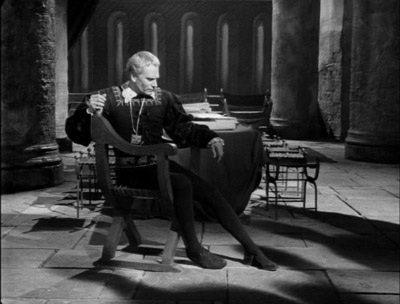
Terrence Rafferty disagrees with me about this; in the essay that accompanies the DVD, he writes
...the striking feature of this performance—as of the whole production—is its atypical vigor: Olivier may be the only actor who has fully recognized that Hamlet’s irresolution has its own fierce energy, and that his morbidity is, at heart, a kind of ardor.
Rafferty's right to note that Olivier gains energy as the play advances, but both Gibson and Branagh gave their versions of the charactor more vigor than Olivier did, and most critics note this (e.g., Roger Ebert: "As for Hamlet, Branagh (like Mel Gibson in the 1991 film) has no interest in playing him as an apologetic mope.") Olivier's portrayal isn't lifeless, but it's a stretch to say it has "fierce energy." Which isn't to say it's a bad performance—I think it's excellent. But I find Rafferty's reading of Olivier's Hamlet bewildering.
And speaking of bewildering, let's get into that inevitable list of ways Olivier's version falls short, and talk about the screenplay. I'm not a textual purist; I have no problem with the hundreds of minor substitutions in Olivier's version (Agee claimed there were only 25, but that seems low). Neither do I mind the cuts: unless you're Kenneth Branagh, filming Hamlet means deciding what to omit. But in most productions, the script is streamlined without being drastically altered. Laurence Olivier and Alan Dent were both certainly capable of trimming Shakespeare without making radical changes—you can see this in Olivier's production of Henry V (which Dent also worked on). But in that case, they had a pretty obvious goal: transform Hal into a national hero that the beseiged Britons could rally behind during World War II. Olivier opens with a similar stab at a unifying purpose, announcing in voiceover that "this is the tragedy of a man who could not make up his mind." But strangely enough, most of the lines that dramatize Hamlet's indecision are missing. And what's left has been shuffled around to the point of incoherence.
It's easy to see what Olivier and Dent were trying for when they rearranged the scenes. As Shakespeare wrote it, Hamlet circles back on itself structurally—if you got coverage on it from a studio executive today, there are lots of scenes that would be excised completely. I.ii, I.iv., and I.v. all have scenes where Hamlet learns about, sees, and talks to his father's ghost; IV.v., IV.vi., and IV.vii. all have scenes of Laertes and Claudius plotting. I can envision page after page of the First Folio with "Do we need this beat again?" scrawled on it. So Olivier and Dent reorganized the play into loosely defined sequences. The part of I.ii. where Hamlet's friends tell him about the ghost has been moved to later, immediately before I.iv. and I.v., forming a loose sequence that might be titled "Hamlet deals with the ghost." The section in II.ii. where the Players arrive and III.ii. (the performance of The Mousetrap) are now adjacent. But while there's less jumping around, this leads to some strange lapses in causality. Olivier and Dent set all the Claudius/Laertes scenes as one giant conversation just after Ophelia's death. But half of the dialogue comes from scenes that are normally before she is dead, so some of the time he seems a little blasé about his dead sister. Still, if you can live with a few off notes, you can make a case that the momentum Olivier picks up by grouping these sequences is worth the cost.
It's harder to defend the outright cuts Olivier has made. Rosencrantz and Guildenstern aren't dead, they've completely vanished. Fortinbras is also missing. And a lot of the plot's mechanics just don't work. The plot to kill Hamlet in England disappears without much explanation, apparently without Hamlet discovering that Claudius wanted him dead. Polonius has to take over Rosencrantz and Guildenstern's investigation into Hamlet's madness, which makes the Hamlet's hostility seem more justified than it should be. And for a production supposedly dedicated to Hamlet's indecision, most of the dialogue that explains why he might be indecisive is gone. You can't write this off completely as a lack of time: Olivier found time to keep Hamlet's acting advice to the players nearly uncut, arguably the most self-indulgent lines in the entire play. But some of the most important information has gone missing, and is sorely missed. Take The Mousetrap, the centerpiece of the play. This is the scene where Hamlet discovers without a doubt that Claudius is guilty; it's a critical moment for him and for the plot. In the text, Hamlet explains what he's up to like this:
...I'll have these players
Play something like the murder of my father
Before mine uncle: I'll observe his looks;
I'll tent him to the quick: if he but blench,
I know my course. The spirit that I have seen
May be the devil: and the devil hath power
To assume a pleasing shape; yea, and perhaps
Out of my weakness and my melancholy,
As he is very potent with such spirits,
Abuses me to damn me: I'll have grounds
More relative than this: the play's the thing
Wherein I'll catch the conscience of the king.
It's expository dialogue, but it's critical information, especially if you're focusing on Hamlet's indecison. But in Olivier and Dent's screenplay, all this is gone except the last couplet, which Olivier delivers as a triumphant yell.

The mousetrap scene itself is the highlight of Desmond Dickenson's cinematography, which is marvelous throughout. The camera tracks back and forth in a lazy semicircle around the audience and stage, settling right behind Claudius as the poison is poured into Gonzago's ear, looping over to see Hamlet and Ophelia's reaction, and eventually tightening its path to focus on Claudius as he rises from his chair. It's sickeningly well staged. But let's say you've decided that your version of Hamlet is about "a man who could not make up his mind." This should be the main reaction shot of your movie. But instead of showing any kind of realization on Hamlet's face when Claudius yells for light, Olivier actually runs up and sticks a torch in his face, laughing demonically.

Played like this, Hamlet seems to have staged The Mousetrap strictly to torment Claudius. To me, that feels sadistic, not indecisive. I kind of like that reading, but it means that Olivier's epigraph is bullshit. Rafferty notes that Olivier took to calling this movie "a study in Hamlet," rather than trying to pass it off as a definitive version. I think that's probably the best way to think of it; it certainly shouldn't be the only way anyone experiences the text. (As an ex-English teacher, let me be clear: don't confuse studying "a study in Hamlet" with "studying Hamlet. N.B., lazy high school students: you want the Branagh version). Still the idiosyncracies of Olivier's version are thought-provoking enough to make it well worth seeing, assuming you're familiar enough with the play to fill in the gaps. And the individual scenes (especially between Hamlet and Gertrude) are magnificent. Put it this way: it has interesting acting, brilliant staging, and absolutely perfect cinematography, all in the service of a text that's a bit of a hash. If you know the play well, the liberties Olivier and Dent take aren't going to be a problem. If you don't know Hamlet well, you should probably quit reading blogs about movies and get to know it well. But Olivier's Hamlet won't help you much.
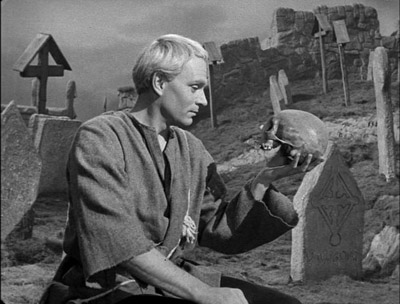
Randoms:
- Straight from the IMDB:
The final scene to be filmed was the famous shot of Olivier jumping off a high tower onto Claudius and killing him, because it was considered to be so dangerous that it was feared that Olivier would injure himself too badly performing the stunt to film any other scenes. Olivier emerged uninjured from the leap, but the stuntman doubling as Claudius was knocked out from the impact and lost two teeth.
And here it is:

- Speaking of uncredited performers like that poor toothless stunt-Claudius, this was one of the first appearances of the inimitable Christopher Lee. He's listed as a "spear-carrier," and I believe this is him (the still is from Hamlet's "mother and father is one flesh" speech from IV.iii.):

- He doesn't look much like Saruman or Count Dooku, or even the Hammer Dracula there, but compare the nose and cheekbones to this headshot from about ten years later (image stolen from here):

- That's gotta be him.
- And speaking of Hammer films and Star Wars (and cheekbones, for that matter), the most incongruous casting is Peter Cushing, as Osric. Osric is one of Shakespeare's most foppish characters. Branagh gave the role to Robin Williams, which should give you a pretty clear picture of the kind of manic silliness most actors bring the part. So this is your chance to see Grand Moff Tarkin at his most cheerful.

- Here his cheekbones look a little more Tarkinesque:

- And speaking of Lord of the Rings films, it seems to me that Peter Jackson's Ringwraiths:
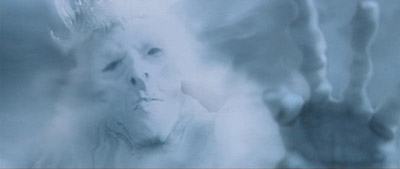
- Owe a bit to Olivier's version of Hamlet's ghost, who looms over Elisnore in a similar fashion:
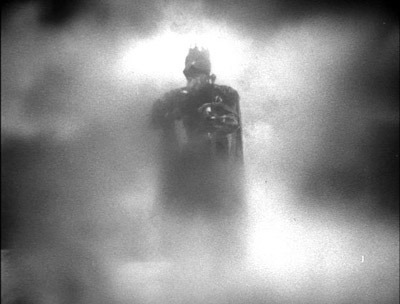
- And looks particularly familiar in close-up:

- I mentioned that Desmond Dickenson's cinematography looked a lot like what you'd see in a horror film. Apparently, horror film directors noticed: he went on to shoot Meet Mr. Lucifer, Horrors of the Black Museum, The City of the Dead, Trog, Tower of Evil, and Murder Ahoy. That last one is more of a mystery than a horror film, apparently, but still, what a title!
- Felix Aylmer's Polonius is pretty definitive. He doesn't capture any amazing insight into the character, but he's the best incompetent busybody I've seen (and his delivery of the list of genres the players know is perfect). Here he is at a typically self-important moment:

- Rafferty notes that the final duel has "an unsettling erotic charge." I think he may have just been confused by Laertes's unsettling codpiece.
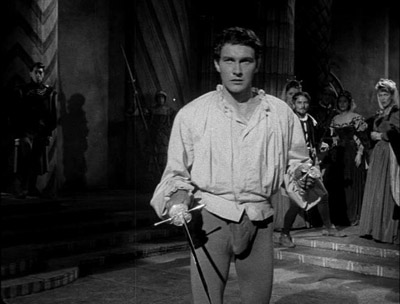
- Jean Simmons's version of Ophelia has not aged well. She's fine towards the beginning, but the mad scenes are difficult for anyone to sell, and viewers raised on method acting are unlikely to be impressed. That's true of most classically acted mad scenes, of course, so you can't really hold it against her.

- She'd previously played Estella in Great Expectations and this performance captures her at a critical point in her career. James Agee seemed quite taken with her, and gives her a lot of space in his review. But he had concerns about her career path:
We know what we are, the mad Ophelia says, in one of the most bemusing lines in the play; but know not what we may be. It is clear to Olivier, as to many others, that Jean Simmons is "an exceptionally bright and promising actress." It is not so clear what she may become. Olivier offered her the chance of a lifetime: a modest and gradual seasoning, first in minor roles, then in larger ones, at the Old Vic in Bristol. There is probably no more propitious training ground for legitimate acting in the English-speaking world. However, Jean has signed a five year, million-dollar contract with J. Arthur Rank. She will next appear in The Blue Lagoon, in which she wears a sarong, and dies, after having an illegitimate baby in a rowboat, somewhere in the South Pacific.Now that's dry reviewing.

